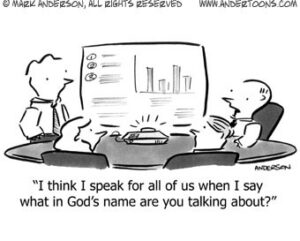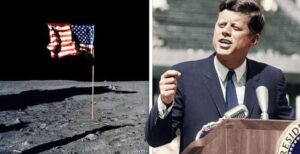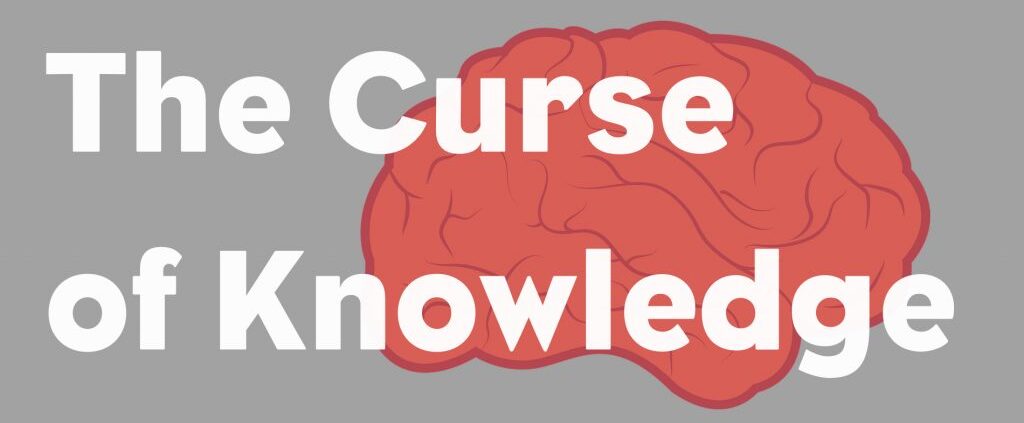The Curse of Knowledge for Preachers
The Curse of Knowledge for Preachers
In this post we are turning away from the subject of the past several weeks, new maps for sermon making, to a challenging subject: the curse of knowledge for preachers as they present their sermons.
What is the Curse of Knowledge?
I am writing this post after being to the optometrist to get new glasses. After examining me, he directed me to an opthalmologist, because my optic nerve is enlarged. He then explained to me how big mine was compared to the normal optic nerve, and didn’t do a very good job. I only have a vague idea of what was wrong with mine after our conversation. The problem was that he has an extensive knowledge of the eye, and he assumed that I had enough knowledge to understand what he was talking about. He was wrong.
Where Does The Term Come From?
 This idea of the curse of knowledge goes back to 1990, when a Stanford University graduate student in psychology, named Elizabeth Newton, performed a series of experiments. Here’s what she did:
This idea of the curse of knowledge goes back to 1990, when a Stanford University graduate student in psychology, named Elizabeth Newton, performed a series of experiments. Here’s what she did:
- First, she got a group of college students together and divided them into two groups.
- One group would be “tappers”. They were asked to pick a well-known song, like “Happy Birthday”, and to tap out the rhythm of that song on a table.
- The “listeners” job was to guess the song that was being tapped out.
Newton asked the tappers to predict what percentage of songs the listeners would guess correctly. The tappers were sure that the listeners would be able to guess 50% of the time. In total, Newton tried this with 120 songs. Listeners only guessed 3 right, a percentage of 2.5%.
What’s the Problem?
Why such a low  percentage? It all boiled down to the fact that when the tapper is tapping out the song, they are hearing it in their heads. In fact, some of the tappers became irate at the listeners, asking, “How can you be so stupid?” when the listeners weren’t hearing the song as well.
percentage? It all boiled down to the fact that when the tapper is tapping out the song, they are hearing it in their heads. In fact, some of the tappers became irate at the listeners, asking, “How can you be so stupid?” when the listeners weren’t hearing the song as well.
Here’s the problem. Once we know something, like the melody of a song, we can’t imagine that someone else doesn’t know it. As one business blog puts it:
Our knowledge has “cursed” us. We have difficulty sharing it with others, because we can’t readily re-create their state of mind.
An Example of the Curse of Knowledge
One of the best examples of how the curse of knowledge might work is John F. Kennedy’s call in 1961 to put a man on the moon by the end of the decade. Chip and Dan Heath, in their book,
Made to Stick: Why Some Ideas Survive and Others Die
Make the following observation about how Kennedy might have announced this endeavor if he had been a CEO.
 “Had John F. Kennedy been a CEO, he would have said, ‘Our mission is to become the international leader in the space industry through maximum team-centered innovation and strategically target aerospace initiatives.’
“Had John F. Kennedy been a CEO, he would have said, ‘Our mission is to become the international leader in the space industry through maximum team-centered innovation and strategically target aerospace initiatives.’
Fortunately, JFK was more intuitive than a modern-day CEO; he knew that opaque, abstract missions don’t captivate and inspire people.
The moon mission was a classic case of a communicator’s dodging the Curse of Knowledge. It was a brilliant and beautiful idea — a single idea that motivated the actions of millions of people for a decade.”
The point is that sometimes we fail to communicate well with our listeners because we know too much, and we are unable to simplify our message for our hearers.
The Curse of Knowledge an the Preacher
Here’s the point for most of us who preach: most of us received training. We have knowledge about how to interpret the Bible, and maybe how to preach. Sometimes, our knowledge can make it difficult for us to communicate with those who don’t have our knowledge. In other words, we are subject to the curse of knowledge for preachers.
In the next post, we’ll consider how to overcome the curse of knowledge, so that our sermons are understood to a greater extent.



